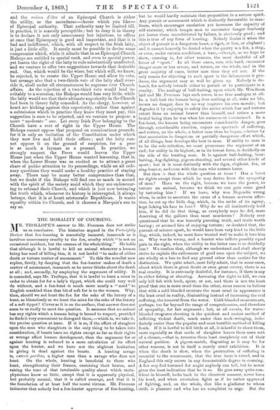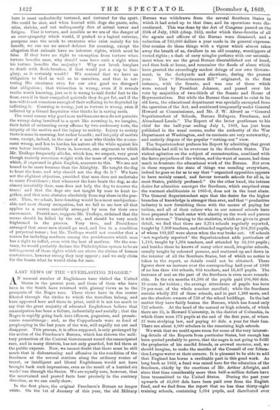THE MORALITY OF COURSING.
VER. TROLLOPE'S answer to Mr. Freeman does not strike in us as conclusive. The historian argued in the Fortnightly Review that fox-hunting is essentially immoral, inasmuch as it involves unnecessary cruelty to the fox, cruelty which " is not an occasional incident, but the essence of the whole thing." He holds that although it is lawful to kill an animal whenever a human being has need of killing him, it is not lawful "to make of either death or torture matter of amusement." To this the novelist now replies, firstly, by denying that the fox-hunter makes of death a matter of amusement, inasmuch as be never thinks about the death at all ; and, secondly, by employing the argument of utility. It is conceded, says Mr. Trollope, that it is lawful to hunt a minx in order to obtain fur for a lady's tippet, which she could very well do without, and a fox-hunt is much more nearly a " need" to English mankind than that bit of soft fur is to the women. Why, then, should we not hunt the fox for the sake of the luxury of a hunt, as blamelessly as we hunt the Lulea for the sake of the luxury of a soft tippet? Clever as it is on the surface, that answer does not seem to us really to meet the question. It assumes that no animal has any rights which a human being is bound to respect, provided he finds it very convenient to disregard them,—which is, we take it, the precise question at issue. If it is so, if the effect of slaughter upon the man who slaughters is the only thing to be taken into consideration, if beasts have no rights except so far as their rights or wrongs affect human development, then the argument for or against hunting is reduced to a mere calculation of its effect upon the hunter, and we have not the slightest hesitation in giving it dead against the beasts. A hunting savage is, creteris paribus, a higher man than a savage who does not hunt. On the whole, hunting is beneficial to those who hunt, strengthening their frames, exercising their brains, and raising the tone of that invaluable quality about which meta- physicians know so little, except that it is apparently physical, but probably mental, that it is called courage, and that it is the foundation of at least half the moral virtues. Mr. Freeman intimates that nobody but a fox-hunter approves of fox-hunting, but he would hardly maintain that proposition in a serious spirit. Any pursuit or amusement which is distinctly favourable to man- liness, which encourages emulation yet increases the capacity of self-restraint, which tempts men to encounter danger fearlessly yet leaves them unembittered by failure, is obviously good ; and this is true of any form of hunting. Nobody denies it when the object of pursuit is a dangerous beast, a tiger, or lion, or elephant ; and it cannot honestly be denied when the quarry is a fox, a stag, or even, under certain conditions, a hare,—though, as we hope to show, coursing is, for other reasons, the most doubtful of all forms of "sport." In all these cases, men ride hard, encounter danger more or less severe, and return, on the whole, and in the great majority of cases, better ineu than they set out. if the only reason for objecting to such sport is the debasement it pro- duces, the argument may as well be given up. Nobody is de- based, for nobody intends either to permit or to participate in a cruelty. The analogy of bull-baiting, upon which Mr. Windham laid and Mr. Freeman lays such stress, is no true analogue at all. In a bull-bait the human being does nothing at all, risks no life, incurs no danger, does in no way improve his own morale ; but degrades it by enjoying in safety the antics which fear and torture extort from an animal braver than himself, and retires a more brutal being than he was when his amusement commenced. In a fox-hunt, the human being encounters considerable danger, goes through considerable exertion, enjoys no spectacle of suffering, and retires, on the whole, a better man than he began,—better by that association in dangerous or partially dangerous effort which, of all things, beat develops the best in man. if utility to man is to be the sole criterion, we must pronounce the argument at an end ; for utility in its highest, as iu its lowest form, is decidedly on. the side of the hunting man. It is against bull-baiting, bear- baiting, dog-fighting, pigeon-shooting, and several other kinds of sport ; but it is most distinctly with the tiger, elephant, fox, or stag-hunter, and even with the man who courses hares.
But then is that the whole question at issue ? Has a beast. no rights except those which he may derive from the sympathy of man? Have we the right, because we have the power, to torture an animal, because we think wo can gain some good by torturing him ? If we have, why was Majendie wrong when, in order to ascertain the cause of a human nervous affec- tion, he cut up the little dog, which, in the midst of its agony, kept licking his face in love ? Why do we all instinctively hold him, if he did do that thing, as everybody says he did, more deserving of the gallows than most murderers ? Nobody ever questioned that he was honestly pursuing truth, and truth worth having ; or accused him of enjoying torture ; or doubted that, the pursuit of science apart, he would have been very kind to the little dog, which, indeed, he must have treated well to make it love him so. Why was he wrong, and a hunter who inflicts possibly equal pain in the right, when the utility in the latter case is so decidedly less ? We confess that, although we understand and shall shortly strive to explain the callousness of good men upon the subject, we are wholly at a loss to find any ground other than motive for the distinction. We quite admit, most fully admit, that in some cases, about which there is great doubt or even great outcry, there is no real cruelty. It is extremely doubtful, for instance, if there is any in either fishing or shooting. Assuming the right to kill, we cam only kill fish with hook, spear, or net, and there is not the least. proof that one is More cruel than the other, some reason to believe that with a cold-blooded creature the most cruel in appearance is the least cruel in reality, diminishing instead of increasing the real suffering, the removal from the water. Cold-blooded creatures are, perhaps, too far beyond the range of comprehension, and therefore of sympathy, for fair argument ; but, at all events, for warm- blooded creatures shooting is the quickest and easiest method of inflicting violent death, much easier than neck-wringing, inde- finitely easier than the popular and most horrible method of killing fowls. If it is lawful to kill birds at all, it is lawful to shoot them, more especially as that mode of slaughter leaves them some sort of a chance,—that is, removes them least completely out of their natural position. A pigeon-match, disgusting as it may be for other reasons, is not in itself a merely cruel exhibition. It is
when the death is slow, when the protraction of suffering is essential to the amusement, that the true issue is raised, and in England this only occurs in any demonstrable degree in coursing.
A fox may feel tortured for aught anybody can tell, but he never gives the least indication that he is so. He goes away quite con-
fident in himself, looks back in the cheeriest manner, never loses his head, and when overtaken fights as if he rather approved of fighting, and, on the whole, dies like a gladiator to whom strife is pleasure and who has no complaint to urge. But the
hare is most undoubtedly tortured, and tortured for the sport. She could be shot, and when hunted with dogs she pants, sobs, cries, shrieks, and not unfrequently dies of actual terror and fatigue. That is torture, and sensible as we are of the danger of an over-sympathy which would, if pushed to a logical extreme, postpone man too much to creatures who exist mainly for his benefit, we can see no sound defence for coursing, except the allegation that animals have no inherent rights, which must be false. If they have no right to exemption from torture when torture benefits man, why should man have such a right when his torture benefits the majority ? Why not brush burglars to death with flesh-brushes, if that would put a stop to bur- glary, as it certainly would ? We contend that we have an obligation to God as well as to ourselves, and that in tor- turing His creatures even for our own good we disregard that obligation ; that vivisection is wrong, even if it reveals truths worth knowing, just as it is wrong to nail ducks' feet to the floor, even if in their compelled quietude they do get fat, and if the hen-wife is not conscious enough of their suffering to be degraded by inflicting it. Coursing is wrong, just as torture is wrong, even if inflicted by a Grand Inquisitor who thinks he is saving souls.
The usual reason why good men and humane men do not perceive the wrong-doing involved in a sport like coursing is, we imagine, their habit of estimating every offence by two customary tests, the iniquity of the motive and the injury to society. Injury to society there is none in coursing, but rather benefit ; and iniquity of motive none, except, indeed, in the case of a man who thinks the amuse- ment wrong, and has to harden his nature all the while against his own better instincts. There is, however, one argument to which Mr. Trollope frequently alludes, which has, we suspect, very great though scarcely conscious weight with the mass of sportsmen, and which, if expressed in plain English, amounts to this. We are not bound to be more humane than the Almighty. He taught the dog to hunt the hare, and why should not the dog do it ? We have not the slightest objection, provided that man does not undertake to assist Providence ; that whenever the hare beats the dog, as she almost invariably does, man does not help the dog to recover the trace; and that the dogs are not taught by man to hunt to- gether, and that man abstains absolutely from any share in the pur- suit. Then, we admit, hare-hunting would be a most unobjection- able and most dreary occupation, but we fail to see how all that applies to a course carefully arranged by men for their own amusement. Providence, suggests Mr. Trollope, ordained that the mouse should be killed by the eat, and should be very much frightened in the process. Very true, and Providence arranged that some men should go mad, and live in a condition of perpetual terror ; but Mr. Trollope would not consider that a reason for including madness among the punishments which man has a right to inflict, even with the best of motives. On the con- trary, he would probably declare the Philadelphian system to be an infringement of those rights which are above the claims of human convenience, however strong they may appear ; and we only claim for the beasts what he would claim for men.



































 Previous page
Previous page